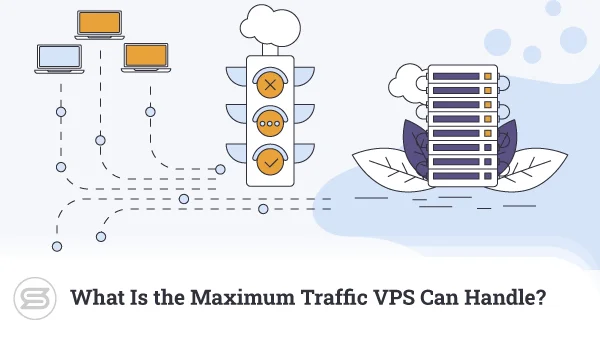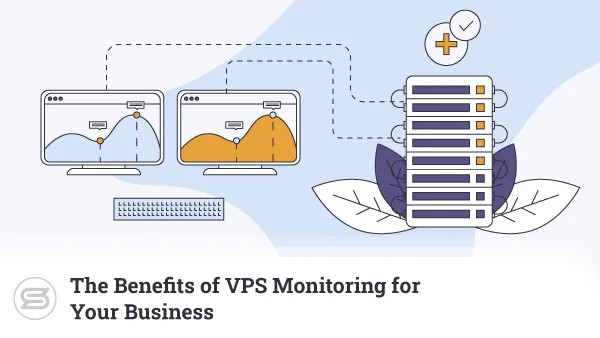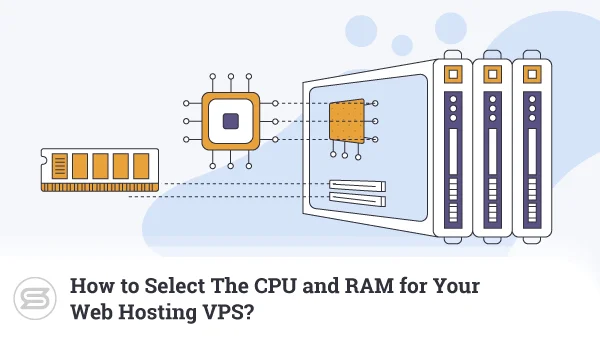SSD cloud VPS solutions are gaining more and more popularity. In the following article, we’ll summarize the advantages of this type of hosting and outline how it can help your project deliver the results you’re after.
We’ll learn how it differs from the rest of the solutions on the market, have a look at how it came to be, and see where it’s going next.
But before we dive deeper into the characteristics of SSD cloud servers, we should quickly explain how important your web hosting service is.
What is Web Hosting?
Hosting is an essential service for your online presence. Put bluntly, you can’t run a website without a hosting account. And in this day and age, you’ll have a hard time sustaining a business without a website.
So, whether you already have an established enterprise or are on the verge of creating one, you need a reliable web host. In exchange for a monthly fee, the provider rents you the storage space, tools, and hardware resources required to keep your project online all the time. Depending on the service, you may also get professional support for any technical difficulties you might have.
There are many different setups and packages, with monthly fees starting from a few dollars per month and going deep into the four-figure range. Our focus today is on SSD cloud hosting.
What is an SSD?
SSD is a relatively new technology that represents one of the most significant innovations since we started storing data in a digital format. The abbreviation stands for Solid-State Drive – the device designed to replace the traditional Hard Disk Drives (HDDs).
Many of you may have seen the internals of an HDD. There are three main components:
- Platters – Disks made of aluminum, glass, or ceramic that store the data. They are covered by a ferromagnetic coating that records the information in the form of 1s and 0s.
- A spindle and spindle motor – The spindle is the shaft that keeps the platters in place, and the motor spins them at high speed. Platters in consumer HDDs rarely exceed 7200RPM, but enterprise-grade disks can reach 15000RPM.
- Read/write heads – The read/write heads are situated at the end of actuator arms and sit nanometers above the spinning platters. As their name suggests, their job is to record and retrieve information.
This data storage technology has been in use since the 1950s, and while it has served us well, the presence of so many moving parts makes it somewhat slow and unreliable by 21st-century standards. This is where SSDs (Solid-State Drives) come in.
The first implementation of SSD technology was in the 1980s when solid-state drives were installed in some of the most advanced supercomputers at the time. The benefits were immediately visible, and they all stemmed from the fact that an SSD is a fully-electronic device with no moving parts.
It uses integrated circuits to record data to a flash memory chip. The chip consists of what’s known as floating gate transistors, which hold the binary code that makes up the files, folders, and databases stored on the device.
Initially, SSD drives were too expensive, and implementing them even in enterprise-grade web hosting servers made no financial sense. As the manufacturing process evolved, however, the price dropped, eventually reaching the point where people started speccing their personal computers with SSDs.
Many web hosting providers have already equipped their servers with solid-state drives, and as we’ll find out in a minute, there are plenty of reasons why you should ensure your host has made the transition. There are other things you should consider, though.
What is a Cloud Server?
The shortcomings of shared hosting should be apparent to everyone by now. It may be the cheapest option around, but sharing the same physical server with so many other people can never give you the performance or reliability you’re after.
In the past, the only alternative was a dedicated server – an entire physical machine reserved especially for you. However, these solutions usually start at over $100 per month, so they’re out of reach for all but the biggest online businesses. Fortunately, there is now a more affordable alternative.
Thanks to virtualization technology, hosts can now offer Virtual Private Servers (VPS). A VPS acts as a standalone server. It provides websites with a completely isolated environment, a dedicated IP, and a predetermined set of guaranteed hardware resources.
The same virtualization technology also lets web hosts set up clouds – enormous pools of hardware resources created by connecting multiple physical machines into a network. Having your VPS deployed in the cloud rather than directly on a physical server has a number of advantages.
Before we get to them, however, let’s look at the different types of cloud servers.
What’s the Difference Between a Managed and an Unmanaged VPS?
Anyone who has ever used a shared hosting account knows there’s nothing too complicated about managing it. You usually get a web hosting control panel with a graphic user interface and all the tools you need to control your files, databases, email and FTP accounts, etc.
If you’re switching from a shared solution to a cloud VPS, you may think that running an entire server on your own would be tricky, especially if you have no prior sysadmin experience. Indeed, if you have to do everything on your own, you may struggle to make the most of your virtual server.
That’s why there are managed VPS solutions. With a managed server, your host is responsible for not only deploying the machine but also configuring and maintaining it in perfect working order.
All the applications and technologies required to run your website are preinstalled, and your provider’s technical experts will be in charge of keeping everything up-to-date and secure. Meanwhile, you get a control panel (just like you do on a shared plan) with a point-and-click interface and the utilities that help you develop and grow your project.
This is good news for most website owners who need a standard setup. However, it might not be ideal for experienced admins with unique websites and requirements for a custom configuration.
Hence, there are also unmanaged VPS solutions. With an unmanaged (or self-managed) server, you get the virtual machine with the operating system installed on it, and from then on, your VPS’s health and performance are in your hands. You can configure all the tools and security systems to your exact specifications, and you’re free to install any application you want, as long as the operating system supports it.
An unmanaged plan gives you root access and complete control over the machine. It’s suitable if you want to tweak everything yourself. On the other hand, if you don’t have the time or knowledge to delve deep into the server’s settings, you’re better off with a managed solution.
Benefits of Using a Cloud VPS Server
Whether you choose a managed or unmanaged plan, a VPS deployed in the cloud gives you plenty of competitive advantages. Let’s look at some of the main ones.
Reliability
Because you are utilizing cloud infrastructure, your VPS is supported by a network of servers instead of a single physical machine. This means that even if one of the servers fails, there are other nodes to take up the slack. Infrastructure-related outages are reduced to a minimum, and your site can record excellent uptime statistics – something that helps with both the user experience and the search engine rankings.
Scalability
One of cloud hosting’s best features is the ability to scale easily. Moving to a more powerful shared plan may require a migration of the entire website, especially if the shared server is overcrowded. Upgrades are an even bigger hassle if you’re on a dedicated server.
By contrast, changing the hardware configuration of a cloud VPS is a matter of a couple of clicks. There’s plenty of room to upgrade, as well. A cloud can grow infinitely, so you can be sure you’ll have the required resources whenever you need them.
Consistent Performance
The entire VPS is reserved just for you. You don’t need to worry about anyone else hogging up the server and disrupting its performance.
A VPS gives you an isolated environment with hardware resources that are available 24/7, so you know what to expect at any time. This is key to building trust in your site’s visitors and converting them into return customers.
Affordability
Several factors about a cloud VPS make it an excellent choice from a financial standpoint. First, because it’s so easily customizable and scalable, you can tailor your hardware configuration to your specific requirements, so you won’t pay for resources you don’t need.
This lets you save mountains of cash you would otherwise spend on a full-blown dedicated server, and you can thank the cloud for that. In addition to the added flexibility, the virtualization technology powering the cloud lets hosts utilize their hardware more efficiently. That’s how you get a reliable, powerful service at a reasonable price.
Support
If you choose a managed cloud VPS, your hosting provider will handle the complicated sysadmin tasks. You can forget the worries surrounding data backups, upgrades, maintenance, and virus protection. The idea is to let you focus solely on your business without wasting time and effort dealing with technical issues.
Benefits of Using an SSD Server
The difference between an SSD and an HDD virtual server lies in the storage devices hosts use. Before signing up, check which technology has been implemented, and make sure your server will be powered by solid-state drives. Here are some of the advantages.
Speed
Speed is one of the make-or-break factors when it comes to web hosting, and in that respect, SSD drives have a definite advantage over traditional HDDs.
Input/Output Operations Per Second (or IOPS) is a metric that describes the speed at which a device can read or write data. IOPS varies between 80 and 180 with traditional HDDs, but the most modern SSDs can theoretically jump to tens or even hundreds of thousands.
The performance boost will not only attract more visitors but impress search engines as well. Google considers over 200 factors when ranking websites, with speed being among the most crucial ones.
Performance
Read/write speed isn’t SSD’s only advantage — file access is also faster. HDD fragmentation often plays a part in slowing down your website.
With a traditional hard drive, the user has to wait for the required data to be located on one of the drive’s platters and served. If the waiting time extends too much (3-5 seconds for the entire page), most people prefer to walk away. In the ecommerce world, this leads to missed revenue and serious financial losses.
This isn’t an issue with an SSD drive. The information is stored in electronic blocks and is much easier to retrieve. As a result, a solid-state drive can give you a massive competitive advantage.
Reliability
The lack of moving parts in solid-state drives minimizes the risk of wearing out, which often happens with traditional HDDs. SSDs don’t vibrate or emit sounds and run smoothly without additional cooling devices.
And while HDDs are susceptible to losing data after a mild knock or a hit, solid-state drives are much more robust. Overall, in terms of data safety, it’s hard to beat an SSD.
A more environmentally friendly service
SSDs use up to 80% less energy and generate less heat than traditional HDDs. The storage device is just one of the many components in a server that uses electricity, so this may not seem like a big deal. However, when you consider how many servers hosting providers run, you’ll see that the difference can be significant.
The tech industry is one of the world’s major polluters, so any efforts to reduce the carbon footprint are more than welcome.
Durability
Mechanical devices are much more prone to failure than electronic ones. HDD technology has improved over the years, with drives becoming smaller and more capacious. However, SSDs are still a much more durable choice because they use microchips rather than spinning disks to store data.
A metric called Mean Time Between Failure (MTBF) has proven that solid-state drives have a significantly longer lifespan than HDDs. This also means that repair costs are reduced to a minimum.
NVMe SSD-Based Hosting – The Next Step
SSDs were initially designed as drop-in replacements for traditional hard drives. You’d remove the old HDD and plug in the new device in exactly the same place on the computer or server’s motherboard.
The new devices were faster, but it soon became apparent that the technology has some unlocked potential. NVMe SSD drives were invented with the idea of unlocking this potential. But how do they differ from the standard SSDs?
NVMe stands for Non-Volatile Memory Express – a protocol for accessing stored data via the PCI Express (PCIe) interface. There’s no difference in the way the data is recorded. Like standard SSDs, NVMe devices store data in electronic chips instead of writing it on disks.
The difference lies in how the information is relayed between the SSD device and the computer’s CPU. Older SSD drives were designed to work with the old SATA and SAS-3 interfaces. They were much quicker than traditional HDDs, but their speed was hampered by the limited volume of data SATA and SAS-3 sockets can pass.
That’s why the technology was adapted to work with the more modern PCIe bus. With it, the storage device can communicate directly with the system’s CPU. The performance benefits are pretty remarkable.
Here’s a little illustration:
| Traditional SSD | NVMe SSD | |
| Throughput | Up to 12Gbps | Up to 256Gbps |
| Read/write speed | 550MB/s | 3200MB/s |
| IOPS | 10,000 | 640,000 |
| Command depth | 254 entries | 64,000 entries |
As you can see, the speed presented by NVMe drives is far superior to traditional SSDs, and the good news is you can take full advantage of the new technology.
All ScalaHosting VPS solutions are powered by state-of-the-art NVMe SSD drives, giving you blistering loading speeds and excellent performance.


Final Takes
SSD cloud hosting deserves all plaudits coming its way — it not only gives you excellent uptime but also comes with great speed and unmatched scalability. The cloud infrastructure provides the secure and reliable environment required to grow your business, and an SSD storage device can guarantee the speed people expect from modern websites.
NVMe drives unleash the technology’s full potential, and now, you can take advantage of them, as well.
Check out ScalaHosting’s SSD cloud solutions and empower your business with a first-class web hosting service.
What is a VPS – Everything you need to know!



